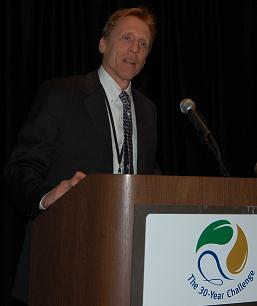 The financial crisis that has gripped many of the urban areas of the country is now spreading out to the rural parts of America. And that is bad news (obviously)… and actually some good news.
The financial crisis that has gripped many of the urban areas of the country is now spreading out to the rural parts of America. And that is bad news (obviously)… and actually some good news.
Attendees of the Farm Foundation’s Food and Agriculture Policy Summit in Washington, D.C. heard from a panel looking at the risks and challenges facing American agriculture… and the state of rural finances was on that list.
While most of the traditional rural banks have stayed out of much of the mess their urban cousins got into when financing homes that lost their values, Paul Ellinger, an extension specialist in agricultural finance with the University of Illinois, told the group that the impact is starting to be felt in rural America because more rural financing was starting to come from the large institutions and insurance companies that have been hit by the crisis. He says commodities are taking the first hit.
 “We’re now seeing the indirect effects of the financial crisis now that it is affecting commodity prices. Now, land prices are starting to soften a little in various areas.”
“We’re now seeing the indirect effects of the financial crisis now that it is affecting commodity prices. Now, land prices are starting to soften a little in various areas.”
Ellinger says there are funds available for agriculture right now, but bankers might get a bit more choosy if margins get too tight.
So what’s the good news in all this? Well, Ellinger says the softening of land prices might slow the trend of prime farmland being turned into housing tracks… an issue we discussed in one of my earlier posts.
That’s another one of the great things about a conference like this, where lots of different viewpoints are brought to the table. You see how interconnected everything really is.
If you want to hear my conversation with Paul just before he took the stage at the Farm Foundation meeting, click here: ellinger1.mp3
Download the audio here. (mp3)

